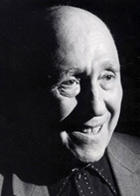Chaim Grade's Quarrel

Mir vet men nit maspid zeyn...
No one will eulogize me...
The death several weeks ago of a reclusive, elderly widow in New York has raised hopes that, at long last, scholars and lovers of Yiddish will have access to the buried treasures in her apartment. These are the legacy—manuscripts, papers, works waiting for translation—of her husband, one of the greatest Jewish writers of modern times.
Chaim Grade (pronounced "grah-deh") was born in 1910 in Vilna, and his life and work were intertwined with the once-vital, now-vanished civilization of Lithuanian Jewry. His father died when he was young; the nimbus of his mother's grief followed him throughout his life. In yeshiva, he absorbed the heady intellectualism of the talmudists together with the relentless introspection and spiritual discipline associated with the "Mussar" movement. Leaving Orthodoxy, he published his first poems and joined the modernist literary circle known as Yung Vilne. He survived the war, though his wife did not, and later made his way to the United States, took a new wife, and in both poetry and prose turned to the exploration of his murdered world.
Grade's style might be best characterized as a form of poetic realism. In novels and stories, he worked to re-create the milieu of his youth as faithfully and as insightfully as he could. In poetry, he conjured up that same world with a carefully controlled lyricism and an exquisite balance of criticism and love. His fictional magnum opus, Tsemakh Atlas (translated into English as "The Yeshiva"), dissects with Dostoyevskyan intensity the world of Lithuanian scholasticism and Mussar, painting an unforgettable portrait of his former teacher, Yeshayahu Karelitz, known as the Hazon Ish. My Mother's Sabbath Days, a memoir, and Rabbis and Wives, a collection of three novellas (republished as The Sacred and the Profane), are at once pitying and pitiless in their delineations of Vilna's intra-Jewish feuds along with its piety and humanity. His best-known story, "My Quarrel with Hersh Rasseyner," dramatizes the conflicts within his own personality as two Holocaust survivors, former yeshiva classmates, argue ferociously over what if anything remains of their friendship and faith.
Grade's preference for moral and imaginative lucidity, for trying to tell things as they were and are, offers perhaps the deepest point of comparison with his celebrated contemporary Isaac Bashevis Singer. Grade's realism was nowhere near so colorful as Singer's phantasmagoria, and his widows and talmudists were humbler fare than Singer's moonstruck mystics, holy fools, and seductive women. To make things harder, Singer was well and plentifully translated. At the end of Cynthia Ozick's classic 1969 story, "Envy; or, Yiddish in America," the character modeled on Grade, unable to make it into English like his rival "the pig Ostrover," is left screaming into a payphone: "I have no translator!"
Whether Grade himself hated Singer is unclear, but his wife Inna's feelings were unmistakable. "I profoundly despise him," she told the New York Times. Her bitterness, coupled with her conviction that nobody was a fit translator for her husband, made her, after his death in 1982, the jealous custodian of an extraordinary literary estate that she had no desire to share. Whatever the source of her furies, they left her husband, and the world he created in words, buried in the dark. Now they may come into the light.
Comments are closed for this article.




